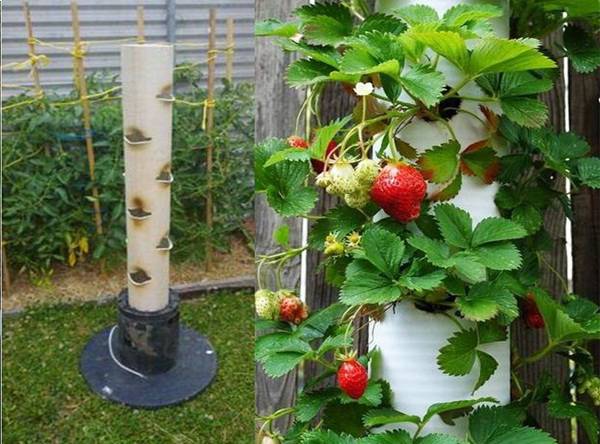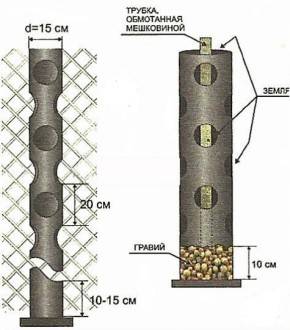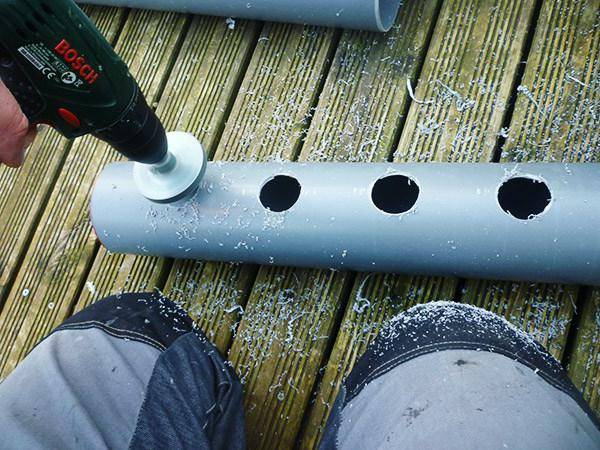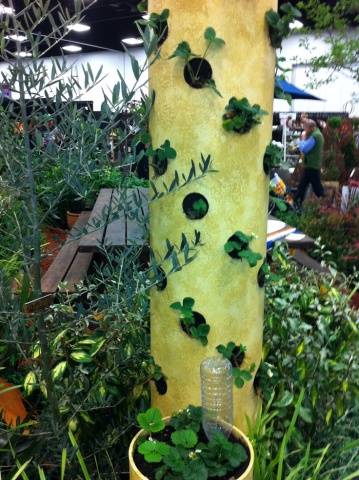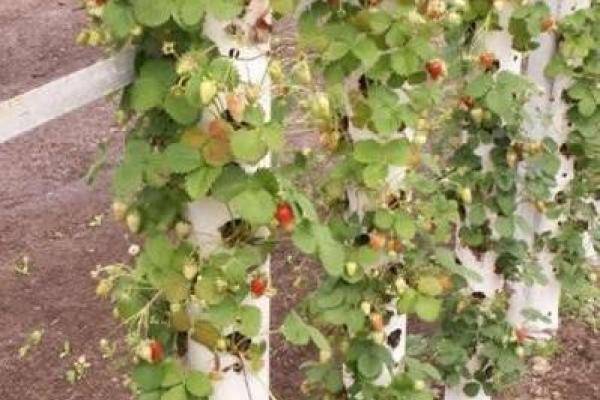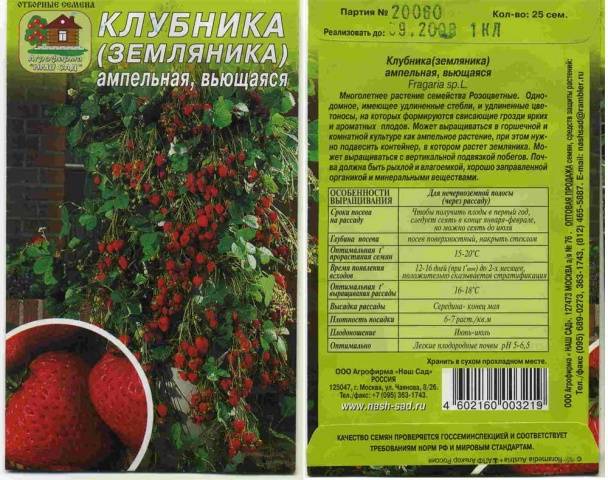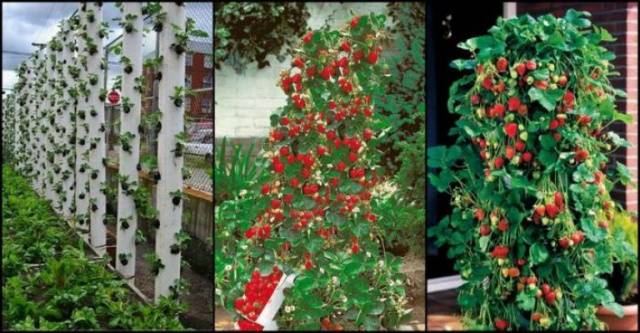Content
Strawberries are a favorite berry of both adults and children. Indescribable taste and aroma, undoubted health benefits are its main advantages. This delicious berry belongs to the Rosaceae family and is a hybrid of Chilean and Virginia strawberries. Both parents come from America, only the Virginian is from the North, and the Chilean is from the South. Currently, there are about 10,000 varieties of this sweet treat, but the most common and traditionally grown are much smaller.
Usually strawberries are grown in garden beds, but the size of the garden plots does not always allow planting as many strawberries as you want. Gardeners have long been using alternative planting methods - in old barrels or car tire pyramids. In such structures, strawberry bushes are arranged vertically. Recently for vertical landing large-diameter PVC pipes are increasingly used. It's easier to work with them, and strawberries in tubes PVC, when planted vertically, looks so attractive that it may well become part of the garden design.
Strawberries love light throughout the day and will not bear fruit in the shade.
What is needed for vertical ridges
Of course, pipes are needed. The larger their diameter, the better - each strawberry bush will have a larger volume of soil. As a rule, the diameter of the outer pipe is chosen from 150 mm. One more PVC pipe is required - internal. Through it, strawberries in vertical pipes will be watered and fed. The diameter of the irrigation pipe should not be large - even 15 mm is enough.
In order to prevent leakage of water or fertilizing mixture in the lower part of the vertical structure, pipe for watering, you need to close it with a plug. To irrigate, the thin pipe must have holes. Warning! Dirt from a large pipe can clog irrigation holes.
To prevent this from happening, the watering device must be secured with a thin cloth or nylon stocking. Geotextiles are also good for this.
To drill holes you need a drill, and to cut pieces of a certain length, you need a knife. Pebbles or gravel as drainage will prevent water from accumulating at the base of the pipe, and therefore, plant decay. The soil for planting will also have to be prepared. Well, the most important thing is high-quality planting material of suitable varieties.
Making a vertical bed
- We determine the height of wide pipes, taking into account the fact that it is convenient to care for the strawberry plantation. We cut pieces of the required size with a knife.
- We make holes in a wide pipe with a large diameter nozzle. The diameter of the hole is such that it is convenient to plant bushes there, usually at least 7 cm. The first hole is made at a height of 20 cm from the ground. If we store the structure in winter, laying it on the ground, there is no need to make holes from the side that will look to the north. For comfortable growth of strawberries, the distance between the planting windows should not be less than 20 cm. Checkerboarding is the best way to arrange the holes.
- We measure and cut off pieces of a thin pipe intended for irrigation. To water and feed the strawberries it was more convenient, we make a thin pipe 15 cm longer than the planting one.
- We perforate the upper 2/3 of the watering device with a drill or screwdriver, the holes are not infrequently located.
- We wrap the watering pipe with a prepared cloth, which should be secured, for example, with a rope.
- We attach the plug to the bottom of the irrigation pipe. This is necessary so that water and liquid dressings do not flow down and are evenly distributed between the strawberry bushes.
- We close the bottom of the large pipe with a lid with holes and fix it. If you have to transfer vertical bed to a new place, the structure will not crumble.
- On selected for vertical beds place a thick pipe. For better stability, you can dig the pipe a little into the ground. Place the prepared drainage on its bottom. It has two functions at once: it does not allow the soil in the lower part of the pipe to become very wet and makes the vertical bed more stable.
- Now we fix the irrigation pipe in the center of the thick pipe.
- We fill up the soil in a thick pipe.
You can watch the video on how to make such a bed from a pipe:
It should be nutritious, but not overly nutritious. The land from the beds on which the nightshades grew, and even more so, strawberries cannot be taken so that the berry does not get sick with late blight.
Soil composition for vertical beds
It is best to prepare turf ground for growing strawberry bushes. If this is not possible, a mixture of soil from a vegetable garden or forest soil from under deciduous trees and aged peat in equal proportions is suitable. For every 10 kg of the mixture, add 1 kg of humus. To this amount, add 10 g of potassium salt, 12 g of ammonium nitrate and 20 g of superphosphate. The mixture is thoroughly mixed and the space between the pipes is filled with it, slightly compacting.
Seedlings are planted in moistened soil.
We plant seedlings
If phytosporin is used in the form of a paste already enriched with humates, it is not necessary to add humate to the root treatment solution. The exposure time is six hours, the seedlings are kept in the shade.
Young rosettes with a developed root system are planted. The roots should not be longer than 8 cm. The length of the roots can be reduced by cutting them. Attention! Never tuck the roots of strawberries when planting. It will hurt for a long time and may simply not take root.
After planting, strawberry bushes need to be shaded for survival. You can cover the vertical bed with a nonwoven fabric.
Plant care
The soil in a vertical bed dries up quickly, so you need to water the vertical plantation often. It is very easy to find out if watering is needed: if the soil is dry at a depth of 2 cm, it's time to moisten the plantings.
Top dressing is a necessary element of the care of vertical beds. Intense fruiting is possible only with good nutrition. Therefore, in addition to three traditional dressings - in early spring, at the budding stage and after fruiting, at least two more will have to be done. A complete complex fertilizer with trace elements and the addition of humate for root growth is the most suitable option. Indoor soil determines the characteristics of fertilizing. They need to be carried out more often, but with solutions of lower concentration.
Strawberry varieties for vertical plantation
Growing strawberries in PVC pipes has a number of features. One of them is choosing the right variety. There are many varieties of this berry that differ not only in taste and appearance, but also in terms of ripening.To grow strawberries, as strawberries are correctly called, in a small space you need to choose a variety that will feel good under these conditions.
The best option would be to plant an ampelous remontant variety.
Of course, such strawberries will not curl, since they are not able to do this by nature, but hanging clusters of strawberries will look especially attractive. And their ability to bear fruit additionally on the newly formed outlets significantly increases the yield. Repaired varieties ripen quite early and bear fruit in waves almost the entire season until frost. But the cultivation of such varieties requires sufficient nutrition and compliance with all growing conditions.
If the gardener can provide such care to the plants, then the most suitable varieties and hybrids are as follows.
Elan F1
The hybrid was developed in Holland. The first berries appear in June, the rest of the harvest is given by Elan's bushes throughout the season until late autumn. The berries are medium in size and large. Their maximum size is 60 grams. The flavor characteristics of this hybrid are beyond praise. If you provide him with proper care, then during the season you can collect up to 2 kg of first-class berries. Elan is resistant to pests and diseases, easily tolerates errors in care.
Geneva
An American variety that has been around for 20 years. Begins to bear fruit in June and does not stop doing it until the very cold weather, giving wave after wave of sweet and tasty berries weighing up to 50 grams. Its peculiarity is unpretentiousness in cultivation.
Conclusion
If everything is done correctly, then you can get the result, as in the photo:
